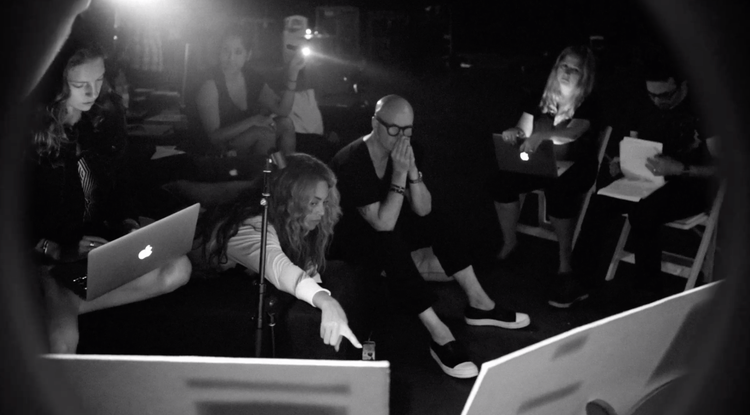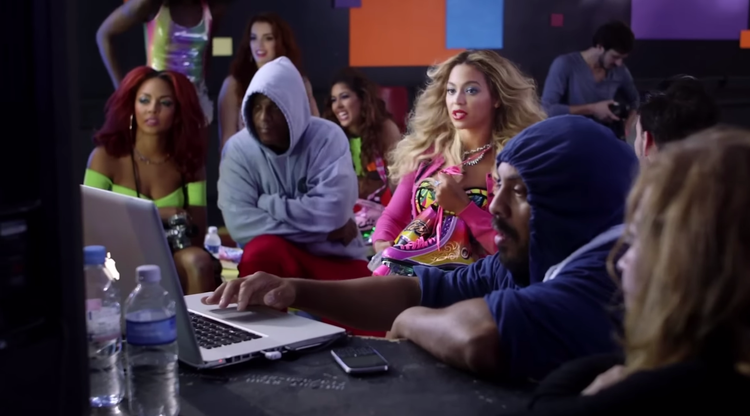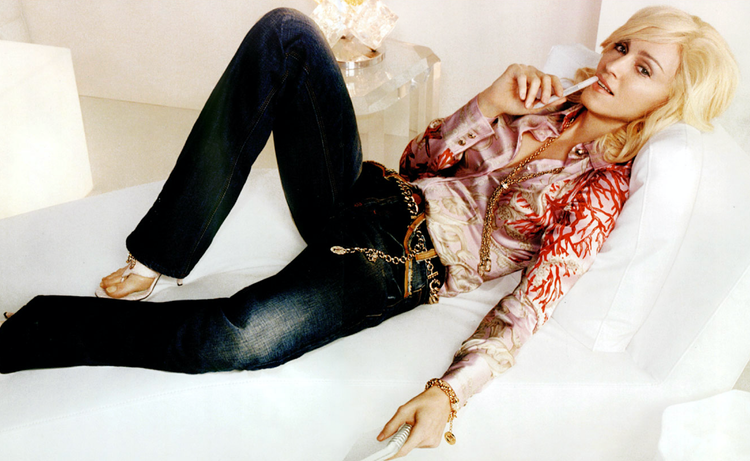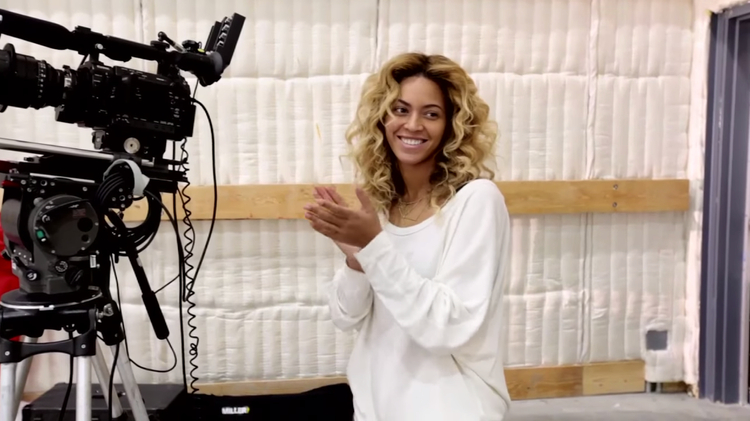Emily Maskell on Baz Lurhmann as the Ringleader of His Own Circus
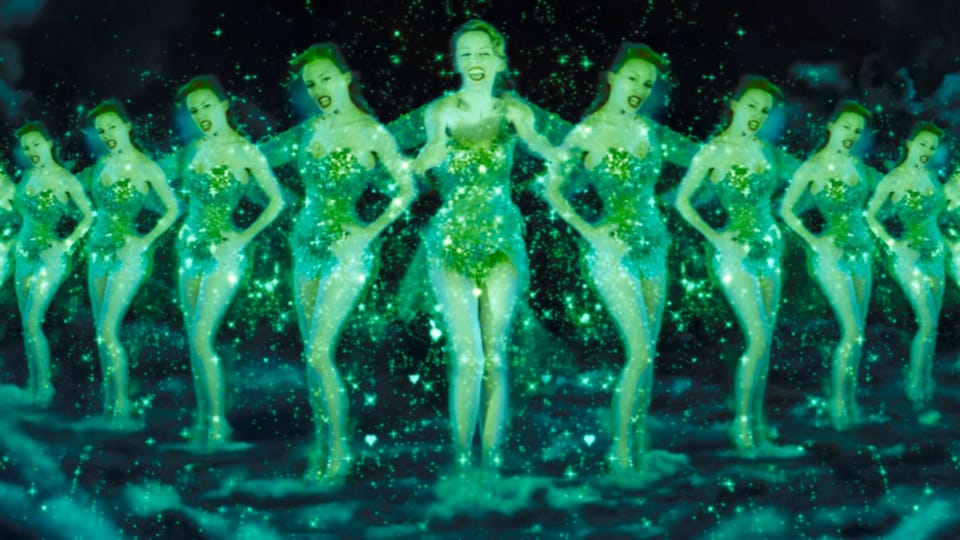
I need just a little more time with the second half of Vol. III—this has easily been the most taxing chapter for both me and Mrs. Carter, if for very different reasons—but I wanted to share something else with all of you in the interim, not technically part of the series but still surprisingly Beyoncé-related.
It’s apparently been a good year and a half since I’ve interviewed anyone in this newsletter, and I’m thrilled to be finally breaking that streak for my longtime internet friend, Em Maskell, who recently became a first-time author with Icons of Cinema: Baz Luhrmann (2024). We should honestly jump right into that without further ado, not just because I’ve been pretty bold about length as of late but also because everything I’d normally take an interview intro to explain (why Baz, why now, etc.) is directly answered below.
I hope you have even a fraction of the fun reading this conversation, which has been edited for length and clarity, as I did having it:
I always like to start author interviews with a version of this question, which in your case would be: what is your Baz Luhrmann origin story? When does he first enter the life of Em the person rather than Em the author?
Way before I was even writing, Baz Luhrmann came into my life. He’s part of—for my generation, anyway—our English curriculum in high school. We watched Romeo + Juliet (1996) as part of learning about William Shakespeare and all the plays. I remember it so vividly, sitting in the classroom. And you know how everyone gets excited when they roll out the TV. So it was then, and I think we watched it in, like, three instalments across the class? It wasn’t the best cinematic viewing. But I just remember everyone being so enraptured by it, and Claire Danes being somewhat of a gay awakening. Just like, What is this? This is so… much. And such an interesting perspective on Shakespeare, to translate to modern audiences as well. I only must have been like… 13, 14, maybe? Something around there.
So Romeo + Juliet is the first Baz that you ever see. I think it was Moulin Rouge! (2001) for me, but I was in a similar boat in that we also watched his Romeo + Juliet in school. Though if I remember correctly, it was the second adaptation we watched because they first made a point of showing us the Franco Zeffirelli version that was sort of… more acceptable. And we had time at the end of the unit, so we threw on the much more fun Baz Luhrmann version.
The entertaining one.
It’s been a lot of fun reading your book and rewatching a lot of this stuff, and kind of thinking about my own early Luhrmann experiences. But tell me how you came to write a book about Baz, and it can be however short or long a story you’d like.
It was such a weird meeting of projects for me. Maybe not for all writers, but for a lot of writers, there’s sort of the book-writing dream, and I didn’t know exactly what I wanted that to be. But just that idea of having a physical manifestation of something you love so much. And I got an email out of the blue one day from Stephanie Milton, who’s now my editor at Bonnier Books’ imprint, Studio Press. And they work a lot with Disney and Marvel and publishing books around that, but what she pitched to me was this new series titled “Icons of Cinema.” Actually, before that it was going to be called Little Book of Baz, or something like that—a different name. But now it’s come to be Icons of Cinema, and she pitched Baz Luhrmann to me. I was like, “100%, yes.” I hadn’t wrote on Baz too much before, but I know I had a little bit, and I think it was from that that our names came up to work on this. But it really was, like, an email out of the blue.
Kismet. That’s so cool.
Yeah, and obviously that’s… I’m incredibly lucky, and also, it’s one of those annoying answers where I’m like, I wish I could give advice? But I don’t even know how you propose a book, to be blunt with you—I don’t know how you go about doing that. I know it’s hard work.
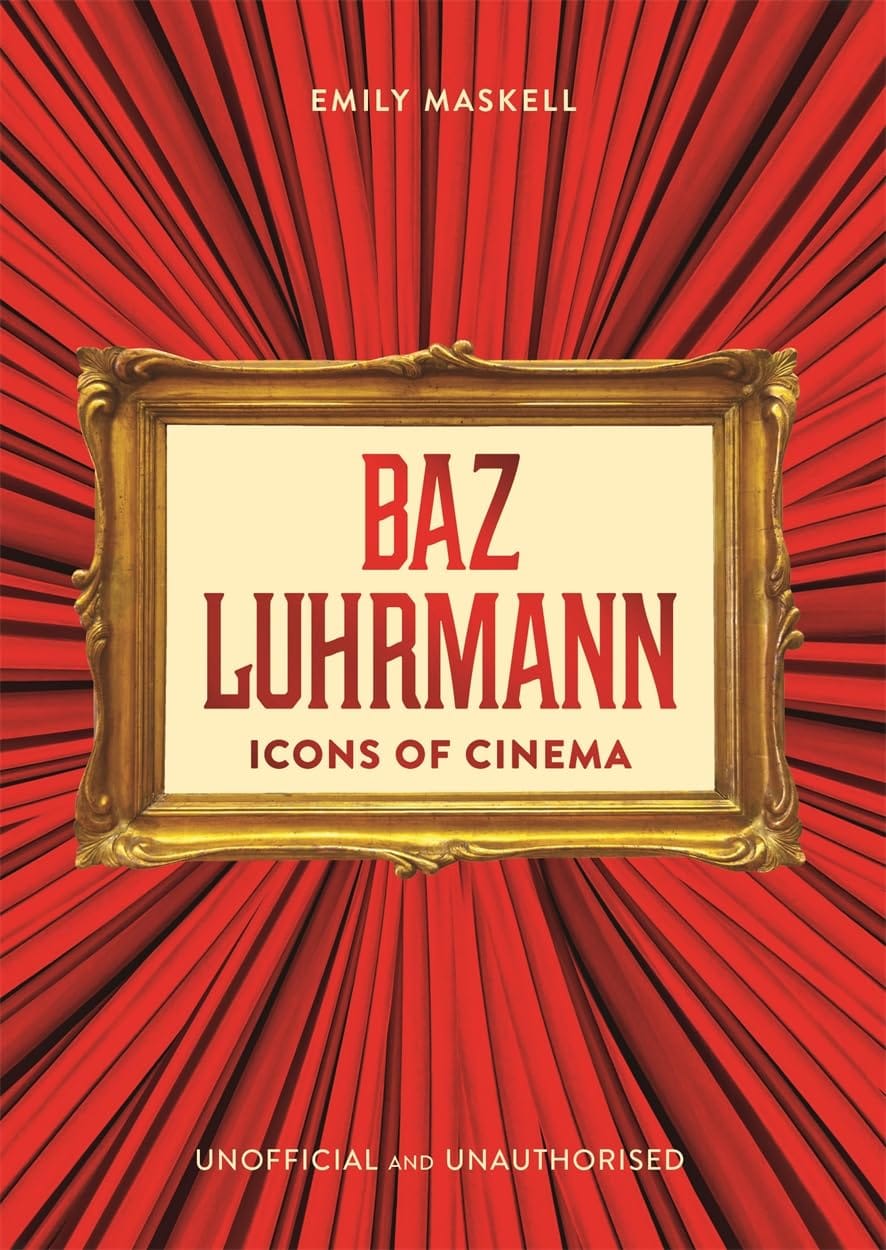
So this is your first book, yeah?
Yeah.
Of many, I’m sure. And so congratulations!
Hopefully, and thank you!
I’m curious in general: how did the writing process go?
It ended up having to be quite a quick turnaround, like a couple of months from the moment.
Oh, wow.
And I got that email at a weird time. I’d just ended a long freelance stint at one outlet where I’d been doing regular work. And you have that sort of freelance abyss, and I was like, Right, I can throw myself into this now. I think the hardest part at the start for me was working out, Okay, this is the first book in what will hopefully become a wider series. How am I gonna approach this? I didn’t have books in the series to fall back on and look at their structure—in terms of film. But Studio have published a lot of books about fashion before, like on Vivienne Westwood, Cartier, Rolex. It was great to look at those books and have a rough idea about how they like to structure how artists come to their projects, and the iconography.
So then, coming to Baz Luhrmann, what came quite naturally for me is breaking down his films. I don’t think I even consciously knew I was doing it, but really trying to go into his films to then unravel them from the inside out. I only sort of recognized I was doing that after, when you go, What did I just write? This idea of really answering that question of: What does make Baz Luhrmann an icon in cinema? And I’ve talked about this before, but I don’t think he necessarily would be the first director that comes to mind when you think of icons of cinema? But when you look at each one of his films and the linear progress that’s come with that, you think, Oh yeah, he loves cinema that’s the bold, big-screen, big-emotions type of cinema. And I think that ties in perfectly to what this series is based on.
It would be both kind of daunting and kind of exciting that you could blaze whatever trail for the series you wanted. I happen to love these kinds of maximalist, outré auteurs, your Baz Luhrmanns and your Joel Schumachers and your Tim Burtons and your Lady Gagas, if you will. And so I’ve wilfully spent a lot of time with that kind of work. But in telling people about your book, you must sometimes encounter the opposite sensibility, the person who’s just like “I can’t deal with that shit.”
Totally.
My own grandmother walked out of Moulin Rouge!, and a few years later it opened my third eye, as I think I put it to you the other day.
I love that phrasing.
But what’s funny is, Baz strikes me on one hand as a critically divisive figure… but when I read back his Wiki page ahead of this chat, I think that summation underplays how successful he is—commercially speaking, but I also hadn’t realized the extent to which he’s involved in all of the production on the soundtrack albums. The man is doing just fine.
Yes.
So I really love spending time in that kind of brain. I think we need these creative giants who take big swings. Even if they miss, I appreciate that there was a swing.
Exactly, and that’s so funny you mention your grandma walking out. My nan, bless her, is a film lover, and she watched a lot of these films again with me, but she watched Moulin Rouge! for the first time and she hated it—but interestingly, hated it for the reasons that I love it.
Right.
You’re jumping around everywhere, you’re not really sure what’s happening until you’re halfway into a scene. And these big musical numbers.
You talk in your book about how some of his big musical moments have eclipsed their original versions. I remember seeing the “El Tango de Roxanne” scene for the first time with a friend after school one day, and I thought I was gonna… die? My mind just exploded. I couldn’t believe it.
Taking that scene as an example… on its face, it’s this explosive number where the violins are going absolutely insane, and then you’ve got this really staccato choreography. But you look back to Strictly Ballroom (1992) and it’s always been there in Baz’s language. His mother was a ballroom dance teacher, so I think it’s ingrained in him to see choreography as a dance that the actors do. And that moment has dance, and then the Greek mythology of Orpheus and Eurydice that undertied Moulin Rouge!.
I feel like there’s a degree where his filmography is somewhat less respected because of this musical layer. I was thinking about this the other night, how you’ve recently had hidden musicals at the box office, like Mean Girls (2024) and Wonka (2023). And I remember learning that before Moulin Rouge!, he was explicitly told to avoid musicals because they weren’t going to be a commercial success.
He’s in some ways one of many “music filmmakers” I find especially interesting. I’ve wanted to get him in the newsletter somehow for a long time, and I always assumed that would mean writing about him—and I may still do that at some later point, but I get to delay it now.
I hope you do!
But when I learned you’d written this book, I was like, Okay, there we go, someone else has done all the work and I get to simply fangirl. And I remember saying to you last year that I wanted to speak to you about it, and that I needed to plan a bit around this Beyoncé project. But then in a funny and mostly unexpected way, he’s come up in every single chapter. In the first one, Beyoncé covers “I’m Kissing You” from Romeo + Juliet, kind of controversially but I don’t really get into that. In the second one, Baz directs this big Oscars medley with her and Hugh Jackman and other musical film stars, and then Baz goes on the record to Vogue saying that there’s this “dramatic cinematic life” in her future. And then in the most recent chunk, I got into The Great Gatsby (2013), where Jay-Z is this key figure in the soundtrack, and Beyoncé ends up on it a couple different ways.
Right.
All of which to say, part of the idea behind me interviewing you was supposed to be, I’ll finally be able to give everyone a bit of a Beyoncé break, but here we are. There was no real break—I’m not even finished with that project the way I’d intended to be by now. But I do think it comes back to something I’d mentioned to you as an interest regarding Baz, which is this really wild, bidirectional relationship he has with pop. And in several senses at once, where he likes to cast pop stars, he likes to tell stories about pop stars, he fills his work with pop music—and all the while, hasn’t really dabbled in music videos, which is interesting. Because all of those things I just said, they’re true of Sofia Coppola but she had a music video history. They’re true of maybe Martin Scorsese, but he has an extensive music film and video history. I’m throwing a lot of words at you.
But you’re right, it seems odd a little bit.
I know there was one for Strictly Ballroom Baz did, but that’s the only one I’ve ever encountered.
You go looking and the closest thing you really get is his commercials.
Commercials and then the musical scenes within the films themselves. Because as you mentioned, he is credited with giving the musical this spiritual rebirth in the form of Moulin Rouge!. He’s a more obvious Friend to Pop Music than maybe Quentin Tarantino, who’s also in that category of, I’ve never directed a music video but we’re gonna write Madonna into this script, we’re gonna put Jamie Foxx in this movie. But then on the other side of the equation, the pop world loves Baz back. Not just by cameoing—it’s not just “Kylie Minogue as the Green Fairy”—but also referencing his work a lot. I think Romeo + Juliet in particular was a key millennial brain moment, and it’s starting to come out now with stuff like Kacey Musgraves’s star-crossed (2021).
I loved that, by the way.
And the fact that her project actually had Diane Venora in it, which I think a lot of people didn’t pick up on at the time. For the sake of the transcript, she’s the actress who played Lady Capulet in Romeo + Juliet. Again, I’m throwing so many words at you.
No, I 100% agree. I found, especially in the nature of the Red Curtain Trilogy [Baz’s first three features, from Strictly Ballroom to Moulin Rouge!], pop music is almost a language for him to communicate to the viewer. The thing about Romeo + Juliet is we’re in Shakespearean tongue throughout that film, and then suddenly you have “Young Hearts Run Free” blasting out. And I think if any point you’ve been turned off, you sort of pick back in, like, I know this song, I know that language, I know how to feel about this moment. I think that’s a really interesting device that he uses. I’m jumping a bit here but…
So am I!
…you to go Elvis (2022), and you hear Doja Cat coming in. It’s a really interesting line that Baz walks between the self-referential history side where he loves cabaret, and he’s referencing Bollywood films in Moulin Rouge!, and sometimes he’s referencing Greek mythology that can pass you over, but it’s suddenly underscored by this pop music that’s very modern, very now. It turns you straight back onto the film regardless of what’s been happening.
What’s been fun for me, but also kind of emotional, is realizing… I think Moulin Rouge! may have been one of the first times I’d ever heard a Madonna song. Romeo + Juliet may have been the first time I’d ever heard a Prince song. And I was kind of going back through all of this stuff like, Whoa, this guy caught me in a key developmental stage and it’s ruined my life! He has this immense respect for showbiz, and pop divas…
…and glamour…
…and grand spectacles. And I want to say borderline-worshippable figures of the stage? Can you remind me if he’s a religious man, or grew up religious? I have this vague memory of him being raised Catholic but I don’t know if I can trust it.
I believe he attended Catholic school in his youth, and I think that perhaps explains a lot of that religiosity that comes up. I couldn’t find him talking more recently about religion in his everyday life. But I think to some degree, there is a transplant of himself in certain aspects of his films—I believe I talk about this on the first page—as a showman, as the ringleader of this circus that’s happening around him. He’s the conductor in the middle of it all, with his little baton.
I feel like I’m maybe moving into a different topic now, but conducting so many different aspects of production, including—as you alluded to earlier—having his fingerprint all over the soundtracks of every single one of these films. And I think that’s to some degree overlooked, the power of what he’s done for these films and their music. It’s just really phenomenal.
This is not unrelated to Elvis in particular… when I interviewed Hannah [Strong] about her Sofia Coppola book a few years back, we talked about her as a sort of curatorial filmmaker, where her movies feel to some extent like, Here are all my favourite songs and colours and people, and I fused them into this eclectic quilt—hope you like it. Do you think that’s also true of Baz?
To some degree, yes. His work is littered with references, not only to cinema but to theatre, opera, cabaret. And before films, he was doing theatre, like Strictly Ballroom was a short play before it was a film. So I think there is this element of his films being so theatrical they’re borderline theatre pieces. The word patchwork is a great descriptor.
I don’t know how allowed this question is, necessarily—I’ll just be thoughtful about how I word it—but would you say that there’s a queer sensibility to his work?
Yes, 100%.
Okay, because you can assume I’m asking that primarily because you cover a lot of queer media, but also… putting aside the fact that there’s a recurring thing online where people learn Baz has a wife, his films are factually speaking full of drag, and divas, and spectacle. You get your homoerotic moments, you get Faramir with a full face of makeup. There’s a reason it resonates with queer audiences the way it does.
I remember getting to that point in the book where it was like, I know I want to write about this. But it’s hard to articulate sometimes. There’s so much thematically in his films, and queer audiences do flock to him, so I think there has to be something there. It’s hard to narrow down, but there’s an essence of grandness to Baz’s campy visuals with theatricality and vibrancy that veers from the conventional. His aesthetic and the journeys of characters seeking freedom can certainly be considered queer-coded in a way that’s so deeply artistic and intentional, where it’s actual campness. I think we’ve seen some films lately perhaps aim for camp and massively fail, but Baz Luhrmann’s films have artificiality but where they’re constructed to be that.
Well, he’ll set out to do something unique in his filmography and make a war epic, and in the end it becomes a love letter to Judy Garland and “Over the Rainbow.”
Exactly, like he can’t help himself.
Australia (2008) was one of the two films I hadn’t seen, the other being Strictly Ballroom. You could maybe also say something about the running themes in his films of romantic tragedy and missed connections and yearning—though it’s not true across the board, and I don’t want to reduce queer art to those themes.
A lot of his films start in a way where you know what the ending is going to be. And there are certain genres within queer cinema—and I feel like I don’t even know what “queer cinema” means anymore, which is exciting—where there’s an elephant in the room here, where we know that devastation is going to come at some point. Like, the classic “kill your gays” trope—Baz does that, but on a different level.
It exists in this little encapsulated world where tragedies can be beautiful for a little while. We can appreciate that the love that’s there is groundbreaking in these stories; it does always feel like the romances are forbidden, often have to be overcome. It’s with the family in Strictly Ballroom and Romeo + Juliet, although I think for me with Strictly Ballroom, it’s a more intriguing perspective on class and overcoming cultural differences. Moulin Rouge!, for me, is the pinnacle of his films today, and it comes with this label of queer cinema.
I’ve seen Elvis now a few times, and I’m already on the record somewhere as an Elvis defender. But I was struck watching that film for the first time and feeling like it was purposely recalling Baz’s career up until that point, where we get all of the Luhrmannisms. We get the Shakespearean starting at the end with our narrator, and we get the helicopter overhead shots right out of the beginning of Romeo + Juliet, and we get the return of these Moulin Rouge! cast members, and we get the pop and rap needle drops like in Great Gatsby. We even get the bohemian principles [from Moulin Rouge!] at the beginning. If Moulin Rouge! is your pinnacle, what actually makes a Baz Luhrmann film, as you see it? How would you explain “the Baz Luhrmann film” to someone at a bar?
I would say there is something Shakespearean about his films in terms of beautiful tragedies. We know the fate from the beginning, which I think is a really important feature. He gives you the answer and then pulls the rug from under you at the end, and goes, “You knew it all along! I told you! Why are you crying? You knew this was gonna happen!”
Big imagery and big emotions also feel very indicative of the cinema that he produces. There’s subtlety, but whenever you watch a Baz Luhrmann film for the first time it is an overwhelming experience, in terms of how bright the imagery is, how emotional these things can be, his love of montage, and putting a camera straight through a dance sequence—making you sort of follow a character through kicking legs and skirts, that kind of thing.
But Luhrmannisms stretch to so many departments. We’ve mentioned the pop music, but there’s also costume and production design—having different layers within mise-en-scène. And then religious imagery… I will always love that image in Romeo + Juliet of Juliet lying on the bed with all these Virgin statues, lit by candlelight. And you’d think she’d have one statue, but she has 20 around her bedside.
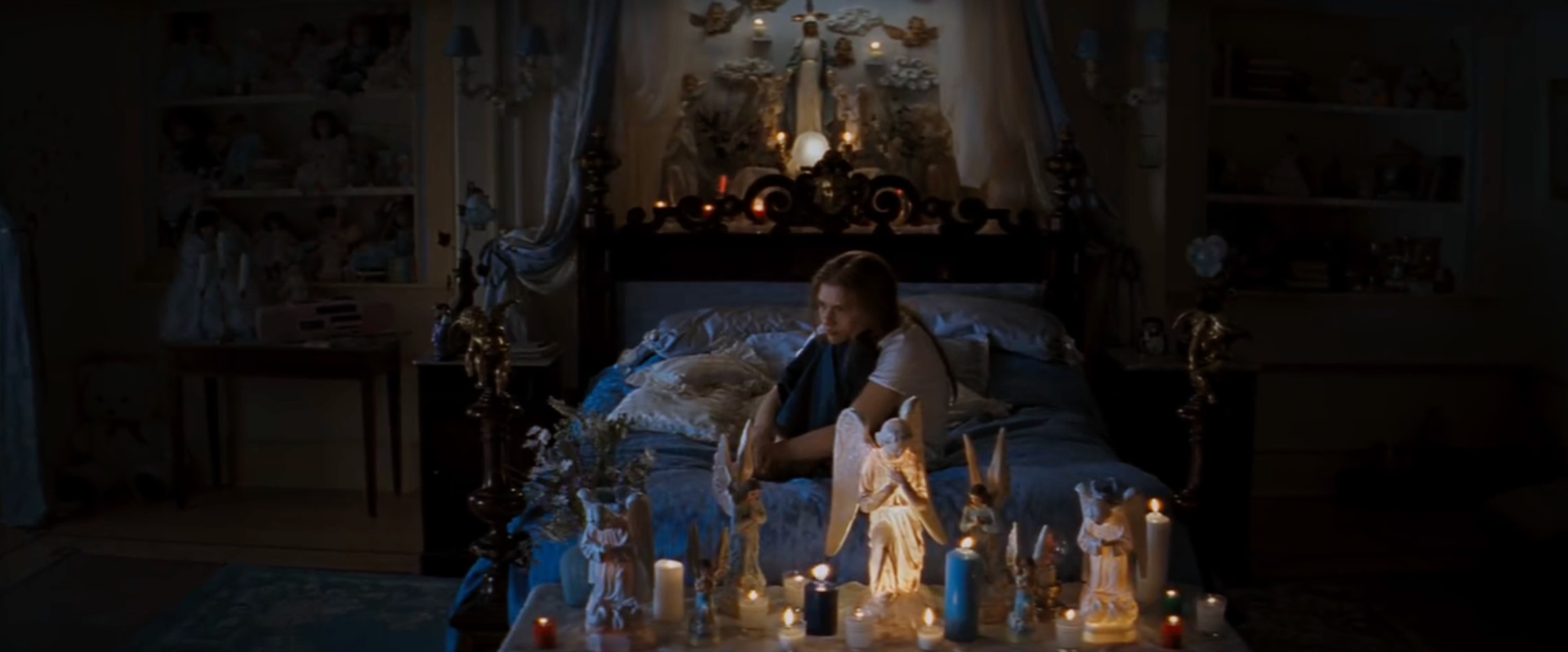
The excess of some of these set-ups is what you remember. And I appreciated that I walked away from your book with a new understanding of how important his wife [Catherine Martin] has been in the making of his entire career, on a visual craftsmanship level. Would you be able to summarize her role?
She has won Oscars, but I feel like she still doesn’t get the flowers she deserves. She’s just as important to his films as his ideas, genuinely. She mainly works across design, production, and costume, but I think you can see her fingerprint in everything, from the way certain films are coloured almost to match costume, the way shots are framed to highlight her costumes and her production design. All of that, I believe, comes from his admiration of her work, and the beauty that she produces to exist in a universe that, to some degree, he creates, but she then fills out.
Oh, I really like that.
The way she’s grown with him, as well, in terms of budget size. The films would get bigger and they just kept matching as it went. If you look at the formidable production design of Gatsby, and the amount of costumes in that, there’s an interesting parallel there with historical accuracy versus artificiality. Her costumes often originate out of a point of historical accuracy, and then she’ll add fabrics that have no business actually being there… bring something that is more a Luhrmannism to this world. So you can be like, Okay, I understand this is in this period, but also this is Baz Luhrmann telling this story. He’s not 100% interested in…
Rule-following?
Yeah.
I do love that Strictly Ballroom is about an artist who won’t colour inside the lines. Would you call it, like… a foreshadow? A threat?
Well I think with his theatre background, it was like an explosion. You watch it now and it’s way more dramatic than it needs to be for a debut, almost. But also very rebellious; he sets up this whole film, and then I love this last moment where we go to silence, and it’s these characters you follow the whole way who create the beat and the rhythm that they want to dance to. And I think that’s a great metaphor for the work that he’s done, that he really has these visions and will fully commit to them.
I guess it’s coming back to this idea of musicals and respect, but I don’t know if he 100% cares if people love or hate him? He just seems to power through. Doing an Elvis biopic is such a huge topic, and it feels like so much pressure, but he completely makes it his own thing. He doesn’t seem to want to bow… he wants to honour the artist, but in the way that he wants to.
Elvis and Priscilla (2023) came out very close to each other, which kind of turned them into opposing films, even though I don’t actually think they cancel each other out. It’s all Elvis Presley, different sides of the one central mythos. You wouldn’t call Coppola a filmmaker stripped of style, though maybe compared to Baz she’s a little less outlandish. But I think it provided people with this prime opportunity to sort of denigrate Baz, and maybe the biopic in general, and Austin Butler’s acting performance in particular, which I thought was excellent.
Piggybacking off of what you said there, I think Baz does do something interesting, where he shows the tricky relationship Elvis had with Black musicians and taking their songs. I don’t think that’s hidden at all.
I didn’t come away from Elvis thinking Elvis was all that saintly—certain scenes arguably hammer you over the head with that fact. You were talking about this idea that you often start at the end with Baz’s films, so you know what the tragedy is going to be before you get to it. Elvis, like Gatsby, has a central romantic relationship in the story but where that’s not the tragedy we’re about to watch. It’s more the homosocial relationship between Elvis and Tom Parker, or between Nick and Jay Gatsby.
Thinking about Elvis and Tom, there is a love story essence—that one needs the other, and when it flips, it gets nasty. And they want different things from each other. I think you can quite easily see the relationship of the film resting there. They become almost bitter exes in the end.
Elvis is probably the film of his that most obviously equates the musical and the spiritual, where I was, on this most recent watch, really taken aback—in a good way—by that early scene of him being introduced to this music he loves so much. The musical is the sexual and the spiritual, and that idea is also there in Moulin Rouge!, it’s there in Great Gatsby. I think it’s the way Baz Luhrmann shoots a performance scene. And again there’s an interesting way that he goes about a glamour shot, gender-wise. You meet Satine and she’s the most gorgeous thing you’ve ever seen, and you meet Romeo and he’s the most gorgeous thing you’ve ever seen. I love how you write that “Luhrmann reveals Romeo like a pin-up, with his half-unbuttoned suit and cigarette dangling from his lips as floppy blonde curtain bangs droop over his eyes.” Such a great sentence, but also a great indicator of the kind of thing I’m talking about. You meet Daisy and she’s the most gorgeous thing you’ve ever seen, and then it happens again with Elvis. Baz seems to really enjoy being alive.
And the bohemian ideal of beauty. He loves to take these actors who are beautiful themselves and then just spotlight that, time and time again.
I’d always been led to believe that Australia was going to be the worst movie I’d ever seen. That was always how people sold it to me, and we had it on DVD at my parents’ house but I’d never watched it—I had to go and borrow it the other day. And then I didn’t hate it, nor did I even think it was god-awful… I actually cried. I do think it was a lot of movie.
So much movie!
And not in the typical stylistic-overwhelm sense for him, but more… There sure is a lot of plot here. I haven’t watched Faraway Downs [Australia recut into a six-episode miniseries, released in 2023], but you can see why he’d make it. Even at his supposed “worst,” he’s still achingly romantic, he’ll still pull at your heartstrings, there will still be a Judy Garland tribute. And all of his movies are Australian movies, but it strikes me as his most Australian movie.
I think it is, to some degree, like a homecoming for him, going back and filming on home turf—both literally and in the story he’s telling, of Australian history and Indigenous culture. And I think there is an intentional move by him to feed us that wrapped up in a romance about a wealthy woman and a poor man coming together.
It’s funny to be in a moment where there is a new Baz project on the way but not imminently. Trying to picture what a Joan of Arc film would look like, whatever I come up with in my head, it probably wouldn’t look like that in the end.
Me too.
So that’s a nice thing to look forward to.
I wanted to ask you, do you think he will do the Madonna biopic?
I would love it if he did! When I was rewatching Elvis, I was thinking that if she ever felt like turning over directorial control—because that’s the big issue here in her case—I think Baz would also probably tell Madonna’s story in an interesting, respectful, batshit way. But this is the thing with all these pop diva-auteurs, it’s hard to cede your artistic vision to someone else’s. It was funny when they had dinner that one night and did a whole photoshoot. He’s kind of fascinatingly destined to be on camera himself. I realize he had an interesting career that preceded the film directing, and then there are the TikToks.
Oh my gosh, I love the TikToks so much.
I hadn’t realized that he very briefly sometimes cameos. And it might be just because the first time you watch something you’re too busy taking in information. But he’s in that one Chanel ad with Nicole Kidman, and then that other Chanel ad with Gisele Bündchen, and then he shows up in Great Gatsby as…
…a waiter.
And I think it’s a blink-and-you-miss-it moment, something for the rewatchers.
There’s a little canon of “I exist within this universe.”
Was there something about this book that totally changed your mind about him or one of his films? Something you 180’d on, or a theme you had no idea would be so big?
Catherine Martin, to some degree. I do really believe the level of involvement she has is overlooked quite a lot, so her as a creative force alongside him. I will also say: I love music, but I didn’t really know anything about Elvis. I wasn’t really an Elvis listener; Elvis was never really on in the house growing up. So that was an education for me, and when the book came around I’d only watched the film once, and that did feel like the chapter at the end that was looming.
That’s interesting.
I sort of know where I am with the rest of the films, and I really felt kind of lost when it came to Elvis. But I think entering that chapter and seeing him as a character… Baz sort of meets his match in terms of showmanship. There’s a mirror there that I think is really fascinating, between the sort of pursuit of artistic greatness and the financiers behind it, like, Are we doing the right thing? Is a musical going to sell? So not so much a 180, but I definitely have greater respect for Baz Luhrmann’s ability to make a biopic—and now know something about Elvis, having known nothing.
That just made me realize there’s this theme in Baz’s projects of, Where is this money to fund the showmanship coming from? That’s why Satine is supposed to sleep with the Duke, and obviously Jay Gatsby is the showman of his story.
I think he does love that idea of, Who’s leading the orchestra? The icons of his stories are always these beautiful people that face such tragedy on an emotional, mammoth level.
The more we talk about him, the more I realize how perfect Joan of Arc is as a subject. You check all of these boxes, including even the basic fact that Joan of Arc is this androgynous religious figure. But also, who’s soundtracking this movie? There’s a lot of cool potential in that. You said Moulin Rouge! is your Baz pinnacle; is that also your desert-island film of his?
I think it has to be. I feel like it almost is, for me, beyond articulation. There’s just so much about it to love, like how unabashedly upfront it is. I’m in love and I’m going to do everything for that. And the tragedy that strikes, all the songs—the “Elephant Love Medley” is obviously iconic. Whenever I’m driving, that’s on and I’m belting it.
I think for me it would also be Moulin Rouge!, though I will say that Elvis, in a fascinating way, instantly shot right up to second place. I’ll see if I still feel that way in five years, though it has already been a couple! I don’t think every single frame and every single creative choice is one I’d defend to the death, but that’s almost what I like about it. But for me it would also be Moulin Rouge!. I’ve always wanted to write about the “The Show Must Go On” scene, and this sort of flipping of an AIDS-specific song into this final act of this woman’s life. It’s a fascinating move, and again everything comes back to this handful of themes. We talk a lot about people covering other people’s songs, but then there’s a way of totally reimagining the meaning of something for a different context—a different illness, a different final show. Anyway, that’s heavy.
You’re right, though.
Is there anything you haven’t been asked on this press journey that you’re dying to talk about?
This doesn’t really answer your question, but it’s been interesting for me as someone who writes for a living to have to then talk about films.
Totally different thing. And I think some days it’s fun and easy, and sometimes it’s just like, I can’t go back and edit what I said?
Hopefully I’ve said something good here.
You’ve said many good things! But yeah, like, I said everything in the book.
There is something interesting about penning something and then talking about it. It’s just really odd! And I think it’s more a constructive thing that I need to work on.
But I know what you mean because I feel the same with my series.
But it’s so good, and it’s always fun to see where Baz is going to be!
He’s just showing up. And that’s how I felt scrolling Instagram and seeing what Madonna was up to that one night. I’ll work a photo of those two into the web page somehow. ●
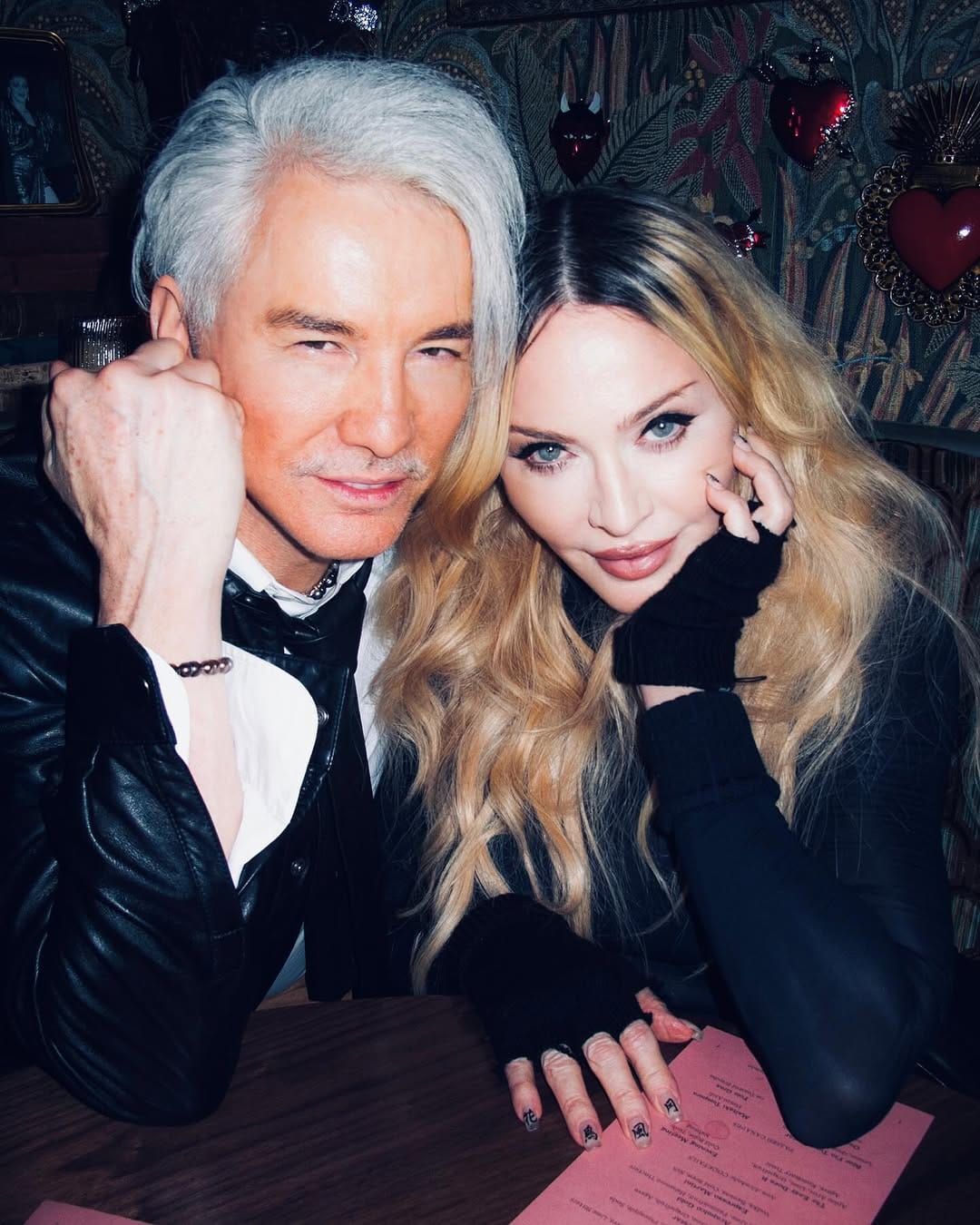
You can buy Emily’s book here.
Some odd(itie)s and ends...
- The first big project of the year for me was EUSEXUA (2025), and as I said on X at some point, I think it’s neat that each of the videos FKA twigs has released for the album was directed by her boyfriend, Jordan Hemingway, the one she’s credited with ‘restoring her faith in love’—a tall order after everything she’s been through, I imagine. “Girl Feels Good” elicited an audible “Oh wow” from me on a first listen, and I was surprised to be as won over as I was by “Childlike Things” with North West. (While I was initially a little annoyed to see it on the tracklist, I found it to be an undeniable earworm, and then this video of twigs explaining the collab kind of sealed the deal—perhaps even more so than the official music video, actually)
- I’m trying something a little different this year and am keeping my 2025 video longlist public as an unlisted YouTube playlist, which I’d say I’ve been updating weekly or so for the past several weeks. As usual, you shouldn’t by any means think of it as “best videos” so much as “stuff my dog and I will need to rewatch to make any shortlists later.” But if I were to quickly pull out half a dozen recs without spending too much time thinking about it—and let me quickly get this newsletter out before I watch the new Miley(s)—they’d probably be: Doechii’s “DENIAL IS A RIVER,” Lady Gaga’s “Abracadabra,” Addison Rae’s “High Fashion,” Rebecca Black’s “Salvation,” Little Simz’s “Flood,” and HAIM’s “Relationships”
- Here are two comically different short film recs that did something for me lately: Solange’s new self-directed Shakersss (2025), which she says she made “for absolutely no reason other than a reminder to myself that light always reveals itself,” and Jim Henson’s slightly older Time Piece (1965), an awe-inspiring project that feels like a prototypical music video in certain ways. (I learned of the latter through the Idea Man [2024] doc on Disney+, which I generally really enjoyed)
- Some hit recipes from the past while: cashew tofu stir-fry, fried sausage and pepper orzo, beef and broccoli stir-fry, creamy garlic mushroom orzo pasta, sticky sesame garlic tofu, and scrambled eggs with spinach
- I was honoured to be asked to help contextualize Lady Gaga’s early career for Be Kind Rewind’s Izzy Custodio, who put together what’s essentially a feature documentary on Gaga’s acting journey so far. I don’t ~publish~ on Gaga as much as I’d like to because I’m always saving my thoughts for a bigger project that I’ve been hoping to follow through on for years, but it wasn’t originally supposed to be a ~years scenario~, so in the aggregate it just seems like I don’t cover Ms. Stefani Germanotta (despite her being 1/3 of my personal Holy Trinity). Anyway, this was a fun opportunity to offload some of those secret thoughts in a different format
- Cowboy Carter (2024) winning Album of the Year at the Grammys was a surprise to me if only because I’ve been trained to expect disappointment anytime Beyoncé is up for AOTY, but zero complaints on my end. I appreciated Carl Wilson’s take on the night for Slate, and also Kyle Denis’s plea in Billboard not to reduce Beyoncé’s win to a sort of lifetime achievement/making-things-right award
- It’s happened multiple times over the years that I’ve read an excellent bit of culture writing in full, then scrolled back up to find out that it of course came from the great Niela Orr. The latest example, but surely not the last, is this pre-halftime show New York Times feature on six key Kendrick Lamar visual moments
- I loved Sabrina Carpenter doing “Espresso” and “Bed Chem” live at the BRITs
- Catching up on 2024 films, one of my biggest surprises has been Piece by Piece (2024), essentially a Pharrell documentary but where everything is Lego. I loved how faithfully it recreates certain music videos onscreen (you see a bit of this in the trailer), and I probably would’ve sought it out earlier had I known there’d be a Lego Beyoncé and a Lego Britney and a Lego Madonna, etc.
- A more traditional doc I got a ton out of was Diane von Furstenberg: Woman in Charge (2024), which does a couple clunky filmmaking things but was still a jolt of Studio 54-adjacent energy that I sorely needed
- I have Gaga’s MAYHEM (2025) on repeat right now—several instant career highlights on there, but I’m also fascinated by the way she’s seemingly finally gotten on top of certain storylines that had felt a bit like they were spinning out of her control. But again, I need to continue shutting up about all of that, so let me link Coleman Spilde’s great review of the album (he’s more generally writing his ass off over at Salon these days, so you should be following him if you aren’t already). I also highly recommend Gaga doing “Killah” on SNL
- Just announced for those of you in London: I’ll be doing a pre-recorded video introduction before a June 12 screening of Alek Keshishian’s Truth or Dare aka In Bed With Madonna (1991). It’s at the Prince Charles Cinema, and this is all thanks to my friend Rógan Graham and her Divas Do Film banner; you can read both of our bios at that link. I’ve only ever done in-person intros so far, but I was raised on iMovie and get 10-15 whole minutes to work my magic on there, so I promise to make it worth your time! Maybe we can even sell the event out? 👀
Mononym Mythology is a newsletter by me, Sydney Urbanek, where I write about various intersections of popular music and moving images. If you got something out of this issue, feel free to share it with a friend or cover one of the caffeinated beverages I’ll need to finish the next issue. You can reply directly to this if you received it in your inbox, and otherwise my email is here. I’m also on X and Instagram.

